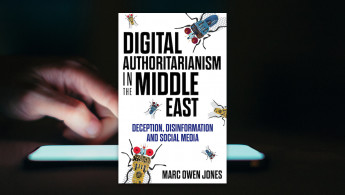Digital Authoritarianism in the Middle East: Deception, Disinformation and Social Media
“Deception can be, and often is, insidious. While conventional weaponry can scar, and create enduring traumas, deception can alter perceptions that dictate behaviours and choices for months, decades or even generations,” warns Marc Owen Jones in his new book Digital Authoritarianism in the Middle East: Deception, Disinformation and Social Media.
Delving into the strange and often unbelievable cyber world of subterfuge, Digital Authoritarianism seeks to understand how Gulf state actors weaponize social media to police dissent, crackdown on potential revolutionary currents and demonise regional rivals.
In the past authoritarian governments sought to control information by limiting it, today the internet makes this approach antiquated and tech-utopians confidently predicted the free flow of ideas would tear down old orders and make us all more open and democratic.
"Digital Authoritarianism comes to us at a critical juncture. Political order in the Middle East remains fragile in certain key countries, and the potential fallout from revolutionary outbreaks, civil unrest, repression or war can still produce a worse crisis than we have already seen"
However, research in places like Russia and elsewhere has shown authoritarian governments have adapted to the new information environment and have turned the free movement of thoughts on its head.
While a lot of ink has been spilt over China and Russia, Gulf countries have been understudied and few have mapped out the weapons of disinformation in the Middle East quite like Marc Owen Jones.
The 2011 Arab Spring shook the ageing governing structures with western media dubbing the mass popular revolts in Tunisia, Egypt, Libya, Syria, Bahrain and elsewhere, the Facebook Revolution.
Regimes in the Middle East seemed to be behind the curve, unable to meet the demands of an assertive citizenry armed with new technology. Indeed stories told by Syrian activists include security services searching through the belongings of detained activists and asking where they “put the Facebook.”
|
The so-called Arab Spring was initially treated as a vindication of the tech-utopian hypothesis by Western pundits, however, even as early as 2011 there were signs that Arab regimes were not as digitally outmatched as they seemed.
“Liliane Khalil had everything,” Digital Authoritarianism opens, “She was young, intelligent, and her career as a journalist was blossoming."
It was 2011 and Liliane Khalil was writing about the Arab Uprisings. Liliane amassed a huge social media following, ran a bureau of Bahrain Independent in the US and interviewed high-profile individuals. There was one problem – Liliane Khalil did not exist.
Jones’ own research revealed plagiarised articles, catfished images and links to the Bahraini regime. Liliane was not the first nor the last online fakery, but her creation provided a glimpse into a new reality in Middle Eastern politics. Post-truth was going to play a bigger role in the Arab public cyber square and Gulf regimes were preparing for it.
Online disinformation is only part of the strategy used by Gulf monarchies, Digital Authoritarianism outlines the role Western PR firms play in sanitising their image in London and Washington.
Indeed a critical component of Gulf disinformation networks is the role the United States and the United Kingdom play. The presidency of Donald Trump brought a number of the US and Saudi interests into line, especially with regard to Iran.
Trump’s tough stance on Iran led to an explosion of anti-Iran hashtags, Trump fan art and trolling of critical voices online. Analysis of the tweets revealed the sentiment was driven by Saudi bots and was designed to give the impression of clear public support for Trump.
|
Outlets in the West would pick up on the hashtags and replicate the news in the press believing it to be a genuine public sentiment.
As Jones writes, “The Trump administration’s maximum pressure policy on Iran, with support from Saudi and the UAE, has created a maelstrom of disinformation in the Middle East.”
Aside from disinformation, another key component of the book is the digital surveillance technologies available to Gulf monarchies, which has enabled them to track down and monitor dissidents – Jamal Khashoggi being the most infamous case, where tracking would play a role in his murder by Saudi security forces acting on orders from the Crown Prince Mohammed Bin Salman.
The book offers this grim warning, “the dystopian potential of social media is ascendant in the Middle East.”
Digital Authoritarianism comes to us at a critical juncture. Political order in the Middle East remains fragile in certain key countries, and the potential fallout from revolutionary outbreaks, civil unrest, repression or war can still produce a worse crisis than we have already seen.
Understanding the mechanism of oppression and control reminds us of the careful work that needs to be done to untangle the web of deceit designed to disempower an active citizenry.
Informative, essential and necessary, Digital Authoritarianism should be consulted and read by anyone concerned about the future direction of tech dystopia.
Usman Butt is a multimedia television researcher, filmmaker and writer based in London. Usman read International Relations and Arabic Language at the University of Westminster and completed a Master of Arts in Palestine Studies at the University of Exeter.
Follow him on Twitter: @TheUsmanButt


